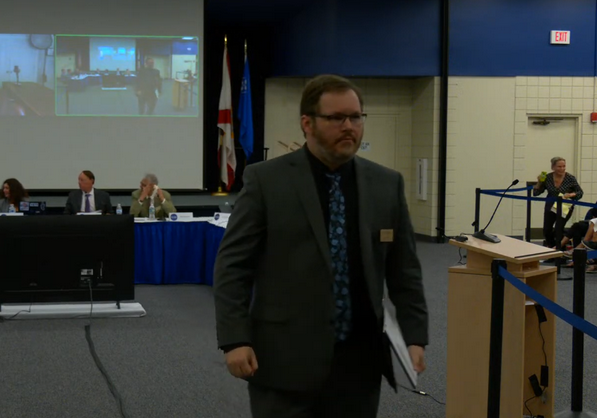First they came for former President Patricia Okker, then they came for the Office of Outreach and Inclusive Excellence (OOIE). And on Apr. 26, the New College Board of Trustees (BOT) continued its trend of disruption by denying five faculty tenure applications, despite all five meeting the full qualifications. Interim President Richard Corcoran had placed a memo recommending denial in all of their files, despite a prior recommendation for approval by then-Interim President Brad Thiessen Feb. 24. Corcoran’s stated reasoning for his contrary recommendation was that the campus is facing “extraordinary circumstances.”
Following this denial, Chair of the Faculty and faculty representative on the BOT Matthew Lepinksi announced that he would be forfeiting his position as a trustee, citing the board’s “destabilization of the academic program” as his reason for suddenly stepping down. Lepinski, Associate Professor of Computer Science, also announced that he would be leaving the college at the end of the semester
Tensions have been running high between faculty and the new trustees, and ran even higher when Corcoran first asked seven faculty members to withdraw their tenure applications on Mar. 15. This resulted in a grievance filed against Corcoran by the New College Chapter of the United Faculty Union (NCUFF). Corcoran also met with faculty for a Q&A session on Apr. 19, where he assured faculty that “there’s no malice” in his motive to deny tenure. Even so, attendees at both the board meeting and the on-campus rally that preceded it expressed strikingly different views. The actions of the board’s majority that day appeared to widen the gap between them and the rest of the New College community, placing the future of the institution further into question.
Before the Meeting
The BOT meeting was held in the Sudakoff Conference Center. Each in-person BOT meeting has included off-campus security, and this one was no exception. Twelve police vehicles were stationed around Sudakoff and the Hamilton Classrooms (HCLs) up to two hours before the meeting was scheduled to begin at 2 p.m., complete with a K-9 unit.
Police tape had been placed around the Sudakoff entrance, where eight officers stood to conduct bag checks and use hand wand metal detectors on those in attendance. Several of these officers were equipped with tasers and bulletproof vests.
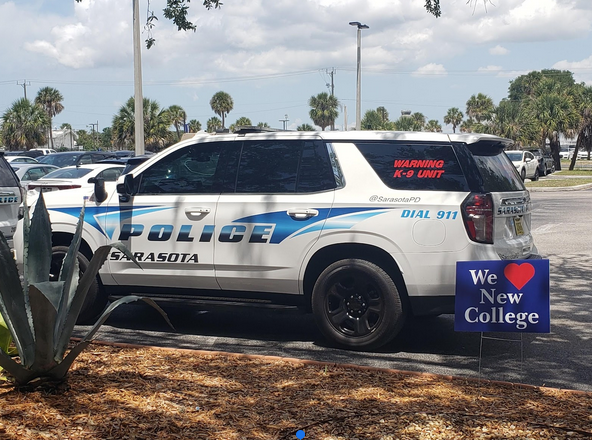
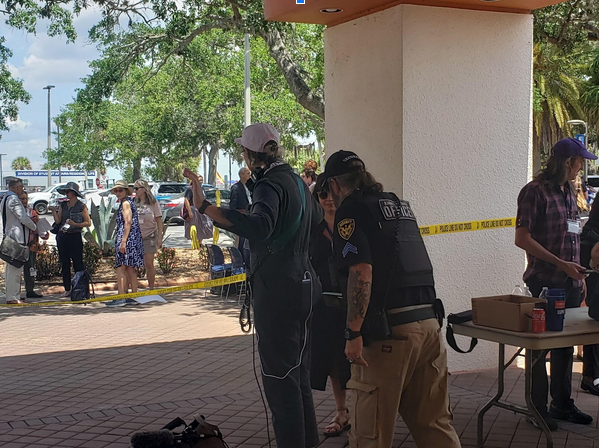
Approximately 150 to 200 seats had been reserved for members of the public, which included members of the media, students, faculty, community members and New College administrators and personnel. Approximately two-thirds of these seats were filled. Many attendees held blue signs reading “grant tenure” and “protect academic freedom.”
Call to Order
The in-person meeting began on time at 2 p.m. and was scheduled to end at 4 p.m., although it lasted until 5 p.m. It was also live streamed. Present were Trustees Jason “Eddie” Speir, Lance Karp, Sarah Mackie, Matthew Spalding, Mark Bauerlein, Mary Ruiz, Matthew Lepinksi, Grace Keenan and Chair Debra Jenks. These trustees were also joined by Corcoran, General Counsel Bill Galvano and Associate VP of Government Relations Christie Fitz-Patrick.
Vice Chair Ron Christaldi and Trustees Christopher Rufo and Charles Kesler attended virtually. Kesler arrived late to the meeting after public comment had concluded and left early without warning, and Christaldi left around 4:30 p.m. due to a previous engagement. Trustee Ryan Anderson was not present.
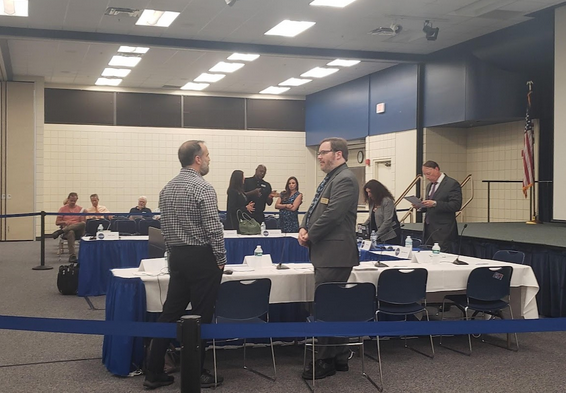
The meeting began with a prayer lead by New College Director of Environmental Health and Safety Yosef Shapiro, first in Hebrew and then in English, asking that all that occur during this meeting be for “the common good and the sake of serving God and our campus community.” Jenks then led the Pledge of Allegiance, and gave a brief statement that the Presidential Search Committee had been established.
Jenks was about to call for public comment when she was interrupted by Speir, who asked that new business be added to the agenda. Sunshine Law requires public notice of agenda items in advance, but after hesitating Jenks agreed that new business could be discussed once all current agenda items had been addressed.
“I would just like to ask our fellow board members if there is new business, if they know of in advance to the meeting, if they could get that to Christie so that it can get on the agenda as opposed to all of the trustees being hit with new items,” Christaldi said by way of procedural clarification.
Public Comment
Fifty people were scheduled for public comment, the highest number ever for any of the in-person or virtual BOT meetings that began on Jan. 31. Twelve of the speakers were current students and 11 were current faculty members, plus one professor emeritus. Jenks periodically hit the conference table with a small hammer when speakers remained at the podium beyond their allotted time.
Overwhelmingly, speakers urged the trustees to honor the tenure process and praised the five faculty members whose applications had come before the board: Assistant Professor of Organic Chemistry Rebecca Black; Assistant Professor of Bioorganic Chemistry Lin Jiang; Assistant Professor of History and Religion Nassima Neggaz; Assistant Professor of Coastal and Marine Science Gerardo Toro-Farmer; and Assistant Professor of Caribbean/Latin American Studies and Music Hugo Viera-Vargas.
Professor of French Language and Literature Amy Reid in particular listed the many accomplishments of her colleagues, claiming that “New College was lucky to recruit them.”
“Gerardo is our one-person GIS [geographic information system] program; Lin integrates chemistry into her CYC [Chart Your Own Course] curriculum, and I was proud to join her in 2021 on ‘United We Stand,’ a panel in response to anti-Asian violence,” Reid told the board. “Becca received grants from the Petroleum Institute to enhance her lab, and she also stocks the Food Pantry for New College students. Hugo brings music to campus and showcases student performance. His website has an interactive musical map of Puerto Rico. Nassima’s research on the history of the Islamic world has been featured in the Boston Globe and on NPR. She gave a great TedTalk in Orlando. Five fantastic scholar teachers who have earned tenure at New College.”
Professor of Physical Chemistry and NCUFF Chair Steven Shipman emphasized that tenure is “an essential part of the American university system” that “[protects] essential scholarship from undue political and economic influence.” Some discussed the precedent that denying tenure during this meeting could create for other tenure-track faculty in the future.
“Candidates must stand in their sixth year, but plenty of strong candidates stand sooner if they’ve met the criteria for tenure,” Associate Professor of Mathematics Chris Kottke said. “I myself stood for it and was granted tenure in my fifth year, just a few years ago, as have a number of my colleagues before and since. And traditionally, the BOT meeting was a celebratory and largely ceremonial end of a long and rigorous process. Not granting tenure to these candidates today, who have followed the same legal processes as myself and other faculty members, creates an untenable double-standard.”
“Should the board deny tenure to these excellent candidates, the effects on our already shaky situation will be catastrophic and widespread,” Professor of French Language and Literature Jocelyn Van Tuyl said. “Without tenure, we will lose faculty and fail to recruit new ones, from all political viewpoints and in all fields. Many of our students will lose their academic advisors, their research mentors, their thesis advisors and the faculty who remain will need to pick up the pieces.”
A member of the public, Associate Professor of Education at John Hopkins University and alum E. Juliana Pare-Blagoev (‘94), stated pointedly that she would not begin delivering her public comment until she could be sure that all members of the board were paying attention. Jenks could be seen periodically looking at her laptop throughout public comment.
“If this board has an ethical compass, how can it endorse the canceling of positive tenure decisions by a president unwilling or unable to articulate a single academic reason for his decisions?” Pare-Blagoev asked. “Endorsing capricious, unreasoned decisions to destroy the professional lives of scholars would tell us all that the core value of liberal arts is the last thing that the board actually stands for. Perhaps that’s why not everybody pays attention to the speakers.”
One student, second-year Alaska Miller—who approached the podium wearing the transgender flag as a cape—raised her voice and began speaking directly to Corcoran during her public comment, which sparked cheers and chanting from the audience.
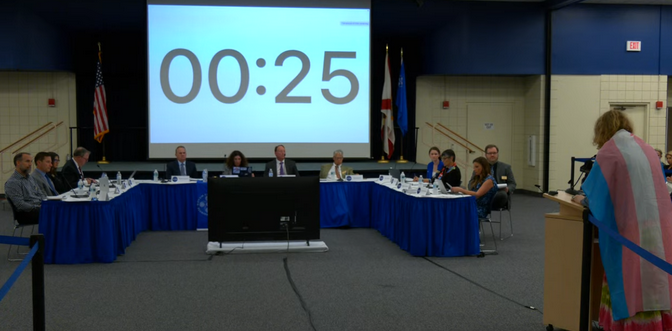
“I want to publicly shame our President, who has shown nothing but apathy and disregard for our student body and our traditions, and to remind him that he is not welcome or wanted on this campus!” Miller said. Miller also uttered an expletive.
In response, Jenks misgendered Miller and asked for security personnel to remove her from the room. An administrator took Miller by the arm and swiftly led her out of the building, with Miller waving her flag over her head as she was escorted outside. While Jenks has threatened during previous meetings to have security personnel remove audience members who raise their voices or become disruptive, this was the first time the board followed through on this policy.
Public comment closed with statements from the Co-Chairs of Diversity and Inclusion for the New College Student Alliance (NCSA) third-year Aurelie Campbell and second-year Hayes Garbez.
“We condemn how our trustees have instilled a culture of fear on this campus, from dismantling our Diversity, Equity and Inclusion (DEI) office, working toward ending our Gender Studies Program and by ignoring the true values of our campus,” Garbez said. “This hostile takeover continues to impact so many of us here, where the chance for a typical semester has been hallmarked by constant phases of grief. It feels as though students, staff and faculty who have spent years working towards building a collective New College have been swept by a moving rug without the consideration of where we all come from.”
“New College hasn’t just been about the students, but the professors who asked me to question elements of my reality and the limits placed on us,” Campbell continued. “I’m ready to ask for a diverse education, ready to challenge limiting and traditional beliefs where education wasn’t originally a place for people like me.”
President’s Report
Following a little over an hour of public comment and a 15-minute break, the board unanimously approved the consent agenda and the President’s Report began. Throughout this report, Corcoran continued to emphasize growth as his priority for New College—as he has done in all previous public addresses—and specifically stated that his two mantras are “students, students, students” and “money, money, money.”
To further emphasize his goals of growth for the college, Corcoran made various comparisons between New College and Ringling College of Art and Design, a private institution which, by consequence, receives better funding than New College. “They’re expecting a freshman class of 500 and they raise somewhere between $15 and $20 million a year, and almost 100 percent of that is from this community,” Corcoran said. A similar statistic was brought up during the faculty Q&A he held on Apr. 19.
Corcoran compared the 2022-23 incoming class for New College, the largest since 2016, with a total of 249 students under Okker’s leadership. Corcoran shared his ambition to break the record and his belief that the school is on track to do so. While he did not provide the number of new students currently enrolled, he did claim that New College is receiving “another five, ten enrollees” every day, and that while numbers are down from where they were at the same time last year, they are steadily climbing.
“Three weeks ago, we were down 36 percent on that number [249 total enrolled in 2022-23],” Corcoran said. “Today, we stand at down 24 percent.” At the emergency faculty meeting held May 1 on Zoom, Interim Provost Brad Thiessen indicated that this percentage has since improved very significantly.
Corcoran claimed that the recent focus on sports programs at New College has attracted many of these prospective students, and that “we’re pushing 80 applicants in probably 30 days. Of those 80 applicants, I think 15 have been accepted.”
Later he continued, “It is astounding to even be discussing having record enrollment given the tumultuous times that we have found ourselves in,” sparking laughter from the audience.
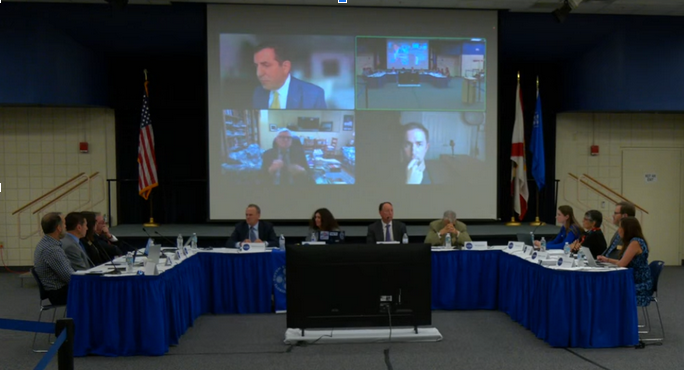
Corcoran began discussing plans to embed “career preparedness” into the curriculum—while not mentioning the college’s Career Engagement & Opportunity (CEO) Office—and explained that faculty would begin receiving further information on this “in the next seven, 14 days.”
I think they’re very, very knowledgeable in many ways, despite sometimes what we necessarily hear,” Corcoran said. “A lot of them are excited; they think it’s an add-on for New College. They don’t think it changes who we are, our identity or anything like that.” It remained unspecified which faculty members Corcoran was claiming to represent. Corcoran also briefly discussed his plans to recruit additional “world-class faculty … from every elite university in the country,” which prompted members of the audience to hold up signs reading “grant tenure.” Corcoran ended his report with a promise to begin sending out weekly updates to the campus community and an assertion that current students will be able to continue their education at New College under the current system.
“To the extent that they want to be under the entire existing system, of course we would honor that, that’s a contract that we have with them,” Corcoran said. “Even the applicants that are applying and had applied before any of this is even thought of, anticipated or made—whatever we recommend would be 100 percent voluntary on their part. The full changes would be implemented over the 2024-28 school year[s].”
Following this report, Keenan attempted to ask Corcoran a question. Jenks stopped her by saying that there was no time for additional questions if the board wanted to finish their meeting by the original 4 p.m. ending time. This immediately sparked outrage in the audience and cries of “let Grace speak,” and “she is our representative, she gets a voice.” Jenks responded first by hitting her hammer against the table to quiet the crowd and then by addressing a specific audience member participating in the outcry.
“You do it again, I’m going to have you removed, in the blue shirt,” Jenks said. “You do not talk to me that way. You do not control this.”
Once the dust settled, Jenks allowed Keenan to ask a question. Keenan asked Corcoran to provide the specific number of deposited students at the time of the meeting versus the number of deposited students at the same time last year. Corcoran could not give a solid confirmation, but did say that “I think we’re at 110 and we were at 136.”
“In future meetings, would it be possible to have that number ready?” Keenan asked. “Because in past years, usually that’s a solid thing that happens at meetings.”
“It’s public record, we’ll share it any time, any place with anyone at any time,” Corcoran replied.
2023 Accountability Plan
The next agenda item was to approve a 2023 Accountability Plan for the college, drafted by Interim Provost Brad Thiessen. An accountability plan where a university sets performance goals for itself over the next five years is created annually and submitted to the Board of Governors (BOG). The plan presented at this meeting contained a series of goals that have been set; more concrete plans for their implementation will be presented in Sept. 2023.
Thiessen explained that the goals in this year’s accountability plan were based on goals from previous years. He also added that he had started drafting this accountability plan “months ago,” with data contributed by various offices on campus.
“There are definite reasons to be optimistic about enrollment and about our other goal of graduation rate, but I wasn’t confident setting what those goals would be, so I kept our goals from the previous accountability plan, just extended them going forward,” he said.
Jenks first proposed an amendment to this Accountability Plan so that the mission statement will include a reference to Florida Statute 1004.32, which also includes information on New College’s mission statement. A motion to approve this amendment passed unanimously.
At approximately this point in the meeting Trustee Charles Kelser suddenly left Zoom without announcement.
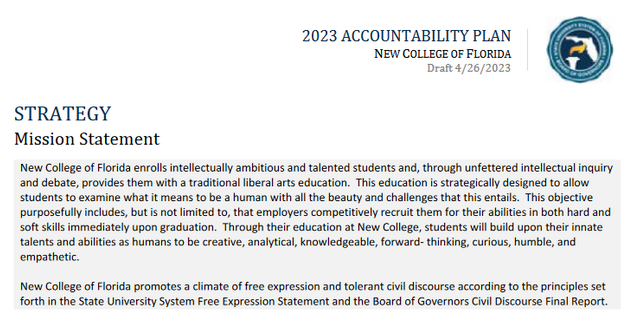
Keenan also proposed a few of her own amendments to the Statement of Strategy section of the Accountability Plan, which included some changes in language to remove the mention of “a chaotic hodgepodge of courses” from the Strengthen quality and reputation of academic programs segment, “unless anyone has proof that we do [have that], I don’t think that we do, especially when we’re going to be sending this document to the BOG.”
She also proposed that the mention of free speech in the Be a beacon of free speech to the nation segment be codified. A motion to approve both of these amendments was passed unanimously, followed by light applause from the audience.
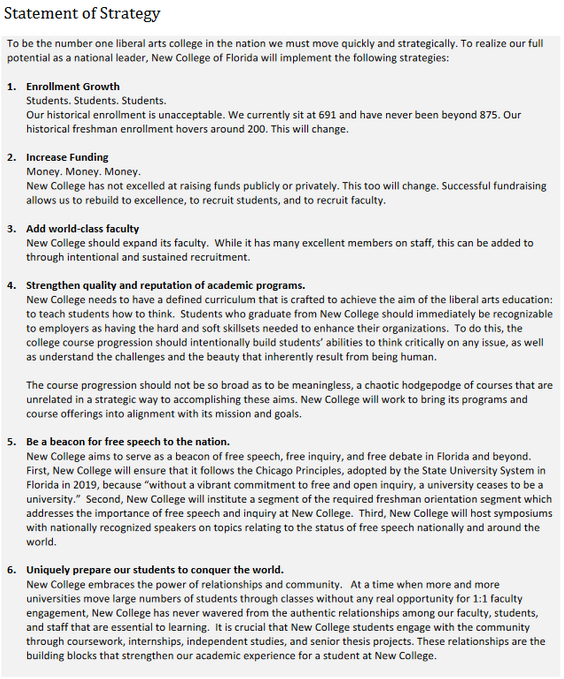
Keenan then motioned to approve the full Accountability Plan as modified. There was no discussion and the motion received unanimous approval. This plan will be implemented at the start of the upcoming fiscal year.
Changing Institutional Accreditors
Briefly, Thiessen also presented a plan reflecting the board’s intention to change institutional accreditors from the Southern Association of Colleges and Schools Commission on Colleges (SACSCOC). He explained that, up until the summer of 2020, universities in the United States were assigned to one of six regional accreditors based on location.
“But in July of 2020, the U.S. Department of Education allowed for these regional accreditors to become institutional accreditors to accredit any university outside of their region,” Thiessen continued. “And following that, Florida Statute 1008.47 requires Florida public colleges and universities to switch from our current accreditor, SACSCOC, to our voluntary choice of any other accreditor.”
From there, Thiessen recommended to the board that New College switch to the Higher Learning Commission (HLC), and also recommended that this transition begin during the 2023-24 fiscal year, primarily because waiting until 2026-27 as previously planned would overlap with the construction of an accreditation decennial review.
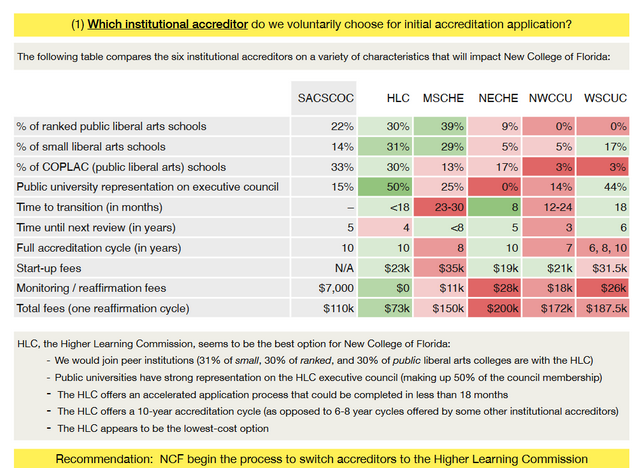
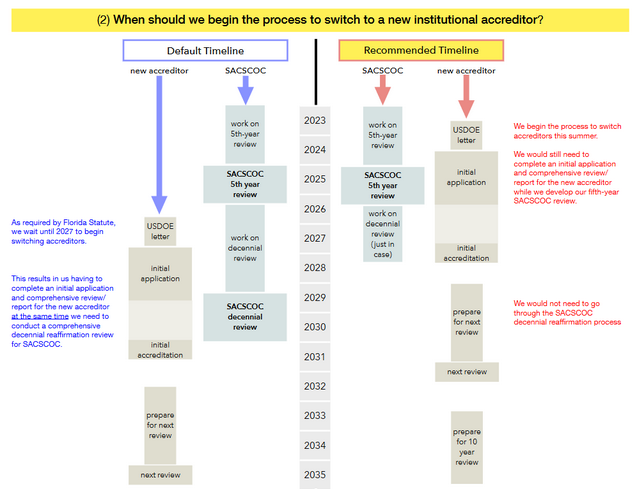
“SACSCOC was never the perfect fit for us,” Ruiz added. “This board has been entertaining reviewing accrediting agencies and selecting the one that’s the better fit. This is the culmination of probably a year of work. It’s not a snap decision and I think that if we don’t start now, we won’t be ready.”
A motion to adopt the changes outlined in Thiessen’s presentation was approved unanimously without further discussion among the board.
Determination of Tenure
By this point in the meeting it was 4:16 p.m. and the meeting had officially gone past its scheduled ending point—something that Jenks once again commented on. Even so, it was time to transition into the most controversial topic on the meeting agenda, which had already been deferred once from the Academic, Student and External Affairs Standing Committee. This subcommittee of the BOT had met on Apr. 17 to originally discuss approving the tenure applications of the five faculty members.
Bauerlein, who chairs this committee, started discussion of the agenda item by explaining that it had been deferred from the subcommittee because, “in my academic experience, the incidents of early tenure has been extremely rare and has only been granted in exceptional circumstances.”
It is usually mandatory for faculty members to stand for tenure in their sixth year, but fifth-year consideration is an option and a percentage of faculty members at New College regularly meet all of the tenure requirements in their fifth year.
The seeming rarity of these circumstances cited by Bauerlein was disputed by multiple trustees, with Keenan explaining that the reason these five faculty members were standing for tenure at the same time was because New College hired 15 faculty members at the same time five years ago. Although 30 percent of these 15 hires were going up for tenure in their fifth year, she argued that these cases were actually not unusual.
“If faculty are able to go up in their fifth year, that means they’ve already reached all of the requirements needed in five instead of six years, which I think is impressive,” Keenan said.
“That’s not the way the tenure clock works,” Bauerlein responded, causing shouts from the audience and Jenks’ use of the hammer once more. “The academic norm isn’t that when you reach all the requirements for tenure, then you go up. That’s not the way it works… I would say that there are exceptional circumstances when someone comes up early. I was told that there are far fewer in the history of New College.”
Amid this discussion, Galvano offered an explanation of the tenure process.
“In order to get before this board, these applicants had to assemble their files for evaluation, they had to have their division vote to make a recommendation at a three-fourth vote, [and] the Provost advisory committee looks at that vote and does its own evaluation,” Galvano said. “The Provost then makes a recommendation to the President. The President is then entitled to review the recommendation, and in the event the President wants to make a contrary recommendation, the rules require that that contrary recommendation be in writing and delineate extraordinary circumstances.
“Because it is early, denial and deferment are tantamount to one another, because they can come back during what’s called the mandatory year and seek again,” Galvano added.
From there, trustees had several questions about the potential ramifications of denying tenure under these circumstances. Galvano clarified further that there would be no legal consequences for denying tenure—only that the Collective Bargaining Agreement with NCUFF required that the board make a definitive decision at this meeting.
While these faculty members can reapply for tenure in their sixth year, Jenks asked whether denying them tenure in this instance meant that they also would not get tenure if they reapplied next year. Keenan chimed in, “After speaking with some of the faculty, it sounds like defer is similar to a no. And so, if they have reached the requirements and gone through the full process and this board, for whatever reason that we have to provide, decides that we would rather defer, they’re probably going to look for new jobs.” This comment earned light applause from the audience.
Ruiz asked Bauerlein whether he found any of the tenure applications “defective,” since he himself is a tenured professor. He answered that there are “some weak publication records” among some of the candidates. Further specifics were not offered.
Keenan asked Galvano for a legal definition of “extraordinary circumstances,” which are the conditions Corcoran cited in making his contrary recommendation for the five tenure applications. More specifically, in the written statements Corcoran provided, “changes in administration including a new President and new Provost” and “turnover of a majority of the Board of Trustees” were listed as examples of the “extraordinary circumstances,” which Keenan contested.
“Changes in administration, changes in trustees are pretty standard processes of the college and we have many outlined procedures for those, so I don’t know if those count as extraordinary,” Keenan said.
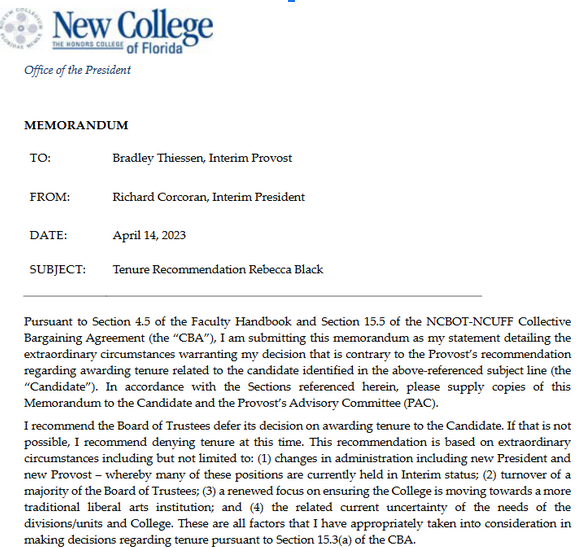
As Keenan was speaking on this point, an audience member called out, “Bauerlein, give her some respect!” Bauerlein was at this point whispering to Galvano away from their microphones.
Galvano explained to the trustees that there would be no legal consequences for not further defining the “extraordinary circumstances” being referenced, or for the board making a vote based on them. It was around this time that Christaldi left the Zoom meeting.
Trustees began addressing Corcoran directly on the topic of his contrary recommendations. Ruiz asked him whether approving the tenures of these five faculty members would “get in your way, given that we’re going to be able to hire so many more faculty?” Corcoran responded by explaining that these faculty could have voluntarily withdrawn their tenure applications by Mar. 15.
“There’s no malice, there’s no anything other than, there’s no denying the fact that these are the trustee meetings that have never existed like this before at the history of New College,” he said. “There is no denying that we are in extraordinary circumstances…Not one single tenured faculty person in this institution since all of this change has happened has been threatened or lost their job.”
Corcoran continued, “Change is scary, but there is nothing that we have done that anyone can constructively point to…that has done anything but protect New College and strengthen it.”
“This is a moment in time where, given that we’re in this process of change, where we also need a little bit of stability,” Lepinski said, countering Corcoran’s point about extraordinary circumstances. “I’m concerned about the way that we might risk destabilizing programs to the detriment of current students if we categorically deny tenure to people that have demonstrated loyalty to the school.”
Keenan then motioned to approve Black’s tenure, which Lepinski seconded. From there, a roll call vote was held: the vote failed 6-4, with Keenan, Lepinksi, Ruiz and Mackie being the trustees to approve Black’s tenure application.
This immediately sparked shouts of “Shame on you” from the audience, prompting Speir to ask Jenks whether additional audience members could be removed. Jenks declined, saying that it would be “too much work.”
What followed were four more rounds of voting in rapid succession, with Keenan motioning for and Lepinski seconding a vote to approve each faculty member’s tenure application. The outcomes for Jiang, Neggaz, Toro-Farmer and Viera-Vargas were identical: each vote failed 6-4, with Keenan, Lepinski, Ruiz and Mackie being the four trustees to vote in favor of their applications.
By the end of all five rounds of voting, continued shouts of “Shame on you,” “puppets” and “cowards” from the audience had increased in volume. Jenks attempted to use her hammer to silence the crowd, to no avail. In response, Speir told the board that he would “like to task the campus police to give a threat assessment and give us a recommendation at the next board meeting.” He continued, saying that the reason for this request was because “part of our task as trustees is student safety.”
In the final three minutes of the meeting, Speir also suddenly brought up the topic of a school mascot, and said that he wanted the Strategic Planning Committee to dedicate time to getting mascot recommendations from the community. Jenks informed him that this process is already underway, and Keenan added that, “historically, things like mascots would usually fall under student government. I’m part of the Strategic Planning Committee, so that’s something I can bring up with Interim President Corcoran.” Speir relented, but added that they need to “get moving on it, quickly.”
Jenks began to formally adjourn the meeting, when Lepinski quickly interjected and gave a final statement: “Thank all of you. I’m very concerned about the direction that this board is going and the destabilization of the academic program, and so I wish you the best of luck but this is my last board meeting. I’m leaving the college.”
This was followed by loud cheering, shouts and a standing ovation from the audience as Lepinski quickly exited Sudakoff through the main entrance. Jenks adjourned the meeting amid chaos and the remaining trustees exited through the rear of the building. The visuals for the official live stream quickly cut to black around this time, but shouts of “Shame on you” could still be heard until the footage abruptly ended.
After the Meeting
Student protestors were waiting outside Sudakoff with tambourines, pots and pans and other noise-making tools as the trustees were sequestered away via golf cart. Jenks appeared to be filming students on her phone as she rode by.
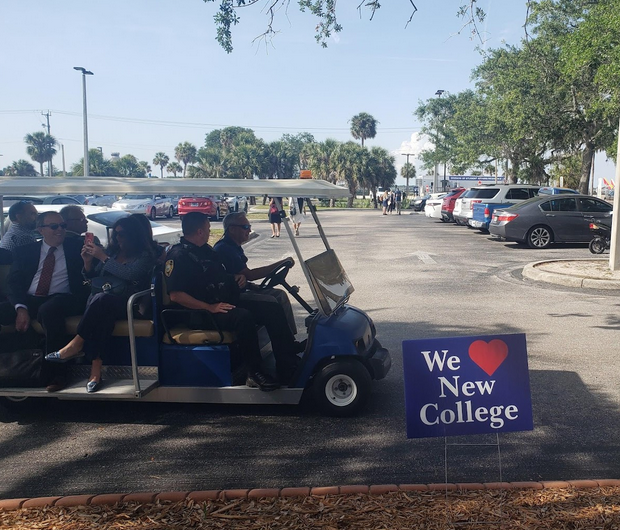
Community members wandered out of the conference center and into the late afternoon, some still seeming dazed. Second-year Devyn Rolls, equipped with a megaphone from the rally earlier that day, addressed the crowd with the following parting words:
“First they come for the people of color, then they come for the queers…then they come for anybody who doesn’t fit their agenda. I want you guys to think about it. I want you all to go back to your dorms, I want you all to go back to your campuses, I want you all to go back to your houses and I want you to think about whether or not you think you’re safe. I want you to acknowledge the precarity of the situation that we’re in. This is not about New College, this is not about college campuses, this is about fascism.”

